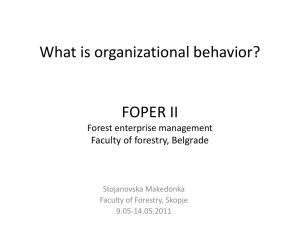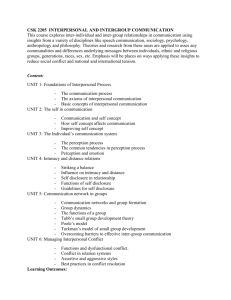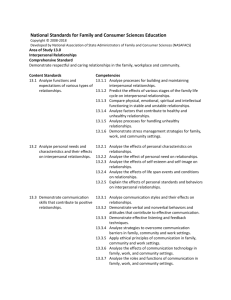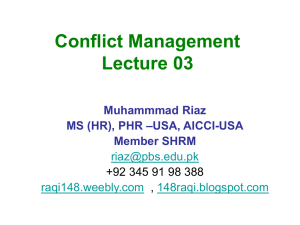CM 7310 Interpersonal, Inter-Group and Community Conflict and
advertisement
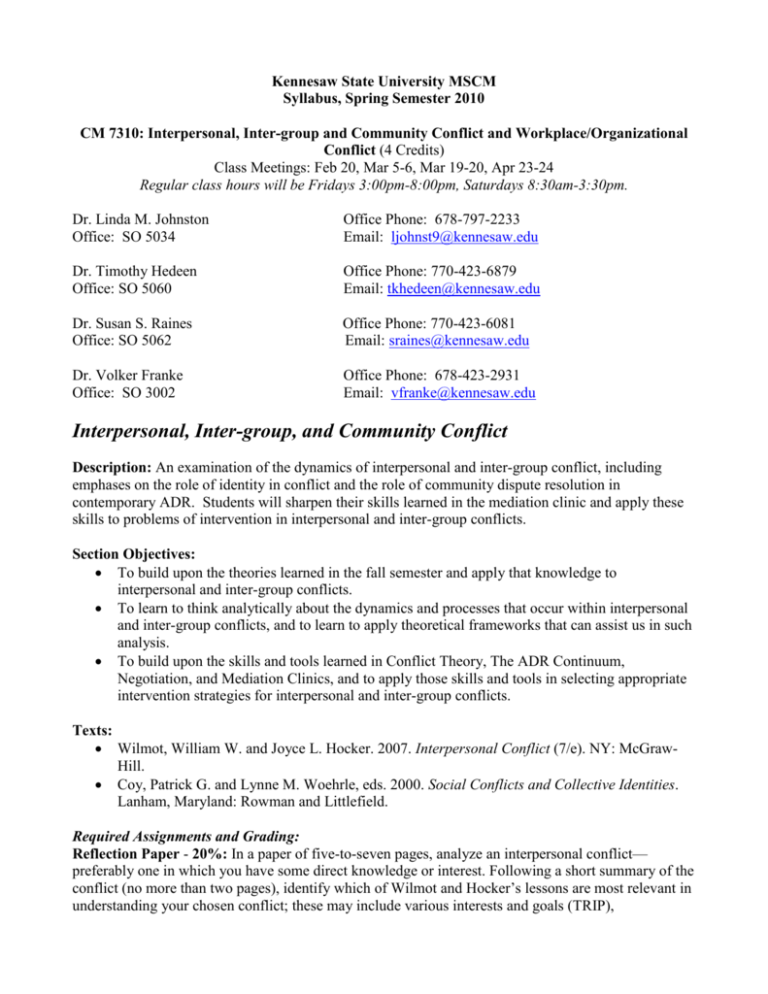
Kennesaw State University MSCM Syllabus, Spring Semester 2010 CM 7310: Interpersonal, Inter-group and Community Conflict and Workplace/Organizational Conflict (4 Credits) Class Meetings: Feb 20, Mar 5-6, Mar 19-20, Apr 23-24 Regular class hours will be Fridays 3:00pm-8:00pm, Saturdays 8:30am-3:30pm. Dr. Linda M. Johnston Office: SO 5034 Office Phone: 678-797-2233 Email: ljohnst9@kennesaw.edu Dr. Timothy Hedeen Office: SO 5060 Office Phone: 770-423-6879 Email: tkhedeen@kennesaw.edu Dr. Susan S. Raines Office: SO 5062 Office Phone: 770-423-6081 Email: sraines@kennesaw.edu Dr. Volker Franke Office: SO 3002 Office Phone: 678-423-2931 Email: vfranke@kennesaw.edu Interpersonal, Inter-group, and Community Conflict Description: An examination of the dynamics of interpersonal and inter-group conflict, including emphases on the role of identity in conflict and the role of community dispute resolution in contemporary ADR. Students will sharpen their skills learned in the mediation clinic and apply these skills to problems of intervention in interpersonal and inter-group conflicts. Section Objectives: To build upon the theories learned in the fall semester and apply that knowledge to interpersonal and inter-group conflicts. To learn to think analytically about the dynamics and processes that occur within interpersonal and inter-group conflicts, and to learn to apply theoretical frameworks that can assist us in such analysis. To build upon the skills and tools learned in Conflict Theory, The ADR Continuum, Negotiation, and Mediation Clinics, and to apply those skills and tools in selecting appropriate intervention strategies for interpersonal and inter-group conflicts. Texts: Wilmot, William W. and Joyce L. Hocker. 2007. Interpersonal Conflict (7/e). NY: McGrawHill. Coy, Patrick G. and Lynne M. Woehrle, eds. 2000. Social Conflicts and Collective Identities. Lanham, Maryland: Rowman and Littlefield. Required Assignments and Grading: Reflection Paper - 20%: In a paper of five-to-seven pages, analyze an interpersonal conflict— preferably one in which you have some direct knowledge or interest. Following a short summary of the conflict (no more than two pages), identify which of Wilmot and Hocker’s lessons are most relevant in understanding your chosen conflict; these may include various interests and goals (TRIP), 2 communication dynamics, gender, cultural effects, power, and others. Due Saturday, January 20th by email. Identity Research and Analysis Paper - 40%: In a paper of eight-to-ten pages, identify and analyze a conflict—one in which you’re not involved—in which identity issues play a role. Employing three or more theories or major concepts from our readings and lectures on identity—these include enemy construction, demonization/dehumanization; simplification/reduction of identity; groupthink; gender, racial or religious identification and alienation; salience of identities; structural conflict and coalitions; social identity theory--provide an analysis of your chosen conflict. Conclude with a short discussion of which, if any, forms of ADR would serve as appropriate interventions. As a research paper, this assignment should involve the integration of outside sources (articles, books, interviews, etc.) other than assigned readings. Due Friday, February 8th by email. Community Conflict Assessment Project - 30%: Choose an organization with which you are deeply familiar (e.g. workplace, civic organization, church, etc). Imagine that you are a conflict management consultant hired to diagnose the sources of conflict and to critique the methods currently used to handle conflict within your organization. Do not focus on storytelling (meaning, do not get bogged down in the details of the particular issue in dispute). Your paper should be 6-8 pages in length, double-spaced (not including the bibliography). Use your readings to help you. Also consider using these resources: see p.91 and Chapter 4 of Managing Public Disputes by Carpenter and Kennedy, Chapter 6 in Designing Conflict Management Systems by Costantino and Sickles-Merchant, and Getting Disputes Resolved by Ury, Brett, and Goldberg. These recommended books are all available to check out in our Conflict Management library. Due March 14th. Your paper should include the following elements: 1. Very brief background of the organization, its sources of conflicts and current policies or methods for addressing conflicts. 2. Are the conflicts structural in nature? 3. What suggestions could you make, if any, to improve the dispute process or the handling of conflict within this organization? Attendance and Participation – 10%: Friday and Saturday, March 19th and 20th: Interpersonal Conflict Dynamics Reading: Wilmot and Hocker, Chapters 1-7 Saturday, March 20th Due: Reflection paper Friday and Saturday, April 9th and 10th: Identity Issues in Conflict; Forgiveness; Commun. DR and RJ Reading: Coy and Woehrle, Chapters 2, 5, 6, 7, 9 Wilmot and Hocker, Chapters 10 and 11 Coleman, Peter T. and J. Krister Lowe. 2007. “Conflict, Identity, and Resilience…,” Conflict Resolution Quarterly 24(4). Supplied in hard copy. Friday, April 9th 3 Due: Research paper Workplace/Organizational Conflict Description: This course is designed to provide students with a deeper understanding of the disputes occurring within the workplace and within the public realm. No one is immune from conflict in the workplace, although some organizations deal with it better than others. Because the costs of workplace conflict are on the rise, there are a growing number of opportunities for neutrals, trainers, and dispute system designers who wish to work in this area. The topic of dispute systems design and Ombudsing will be covered in greater depth this summer during the Dispute Systems Design Skills clinic. Texts: The Five Dysfunctions of a Team: A Leadership Fable, by Patrick Leoncioni Articles: Craig McEwen , Managing Corporate Disputing. Supplied in hard copy. Elangovan, A.R., Managerial Intervention in Organizational Disputes: Testing a Prescriptive Model of Strategy Selection. Supplied in hard copy. Required Assignments and Grading: Attendance and Participation: (15%) This includes your presence for all class hours as well as the extent to which your actions promote or inhibit your own learning and the learning of others. Giving and receiving feedback Homework exercises: (85%) Due May 1st via email This homework exercise will be distributed in advance via email. Friday, April 23rd: Assessing and Addressing Workplace Disputes Agenda: Conflict Assessments, Giving and Receiving Constructive Criticism, Bridging the Generation Gap in the workplace. Saturday, April 24th: Managing Corporate Disputes Agenda: Costs of Workplace Conflict, Various Corporate Responses to Conflict, Understanding the EEOC process (Guest Speaker if possible) Reading: Craig McEwen , Managing Corporate Disputing. Supplied in hard copy. Elangovan, A.R., Managerial Intervention in Organizational Disputes: Testing a Prescriptive Model of Strategy Selection. Supplied in hard copy. Overall Expectations: One of the essential skills of the conflict resolution professional is the ability to create a safe space. This class, and indeed all of the classes in the MSCM curriculum, is intended to be an opportunity to explore freely and to take risks in a safe environment. Students are expected to participate in creating a dynamic learning environment for all members of the class. Grading: Grades will be based on a combination of written work, attendance and participation, and presentations (if any). What does an A, B, or C “look like?” Students whose participation, papers, and exam answers exceed adequate levels will receive an A. Students whose participation, papers, and exam answers are adequate will receive a B. 4 Students whose participation, papers, and exam answers are not adequate will receive a C or lower. Late Work: Homework and research papers must be turned in on time. Late work may receive a reduced grade. If you are not able to turn an assignment in on time, please let us know in advance. Written Work: Written communication, as well as oral communication, is the hallmark of the effective conflict manager. For this reason, writing is an important component of the MSCM program. Written work will be evaluated primarily on the basis of content. However, originality, organization, writing style, and research (if applicable) are important components of written assignments. Course Attendance: Since class meetings are limited, it is imperative that students attend all class meetings. Individual exceptions to this rule will be limited to cases of emergency or serious illness. If a student fails to provide acceptable documentation that an absence is due to emergency or serious illness, the grade for the course in question may be lowered one letter grade. Academic Integrity Statement: Every KSU student is responsible for upholding the provisions of the Student Code of Conduct, as published in the Undergraduate and Graduate Catalogs. Section II of the Student Code of Conduct addresses the University's policy on academic honesty, including provisions regarding plagiarism and cheating, unauthorized access to University materials, misrepresentation/falsification of University records or academic work, malicious removal, retention, or destruction of library materials, malicious/intentional misuse of computer facilities and/or services, and misuse of student identification cards. Incidents of alleged academic misconduct will be handled through the established procedures of the University Judiciary Program, which includes either an "informal" resolution by a faculty member, resulting in a grade adjustment, or a formal hearing procedure, which may subject a student to the Code of Conduct's minimum one semester suspension requirement. Please note: Turning in the work of others as your own, turning in papers downloaded from the Internet as your own, using more than three substantive words in order from an uncited source, and/or using ideas or concepts borrowed from others without adequate citation will be considered plagiarism. We reserve the right to review any student papers and assignments through plagiarism-review services or software.
